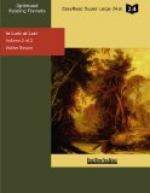Always Lala Roy with her grandfather, as if their interests were identical, and, indeed, he had lived so long with them that Iris could not separate the two old men.
“We will all live together,” Iris continued, “and when our fortune is made we will all live in a palace. And now, grandfather, that we have relieved our feelings, shall we have the story and the opening of the papers in the safe?”
“Which will you have first?” Mr. Emblem asked again.
“Oh, the safe,” said Arnold. “The story can wait. Let us examine the contents of the safe.”
“The story,” said Mr. Emblem, “is nearly all told in your father’s letter, my dear. But there is a little that I would tell you first, before I read that letter. You know, Iris, that I have never been rich; my shop has kept me up till now, but I have never been able to put by money. Well—my daughter Alice, your poor mother, my dear, who was as good and clever as you are, was determined to earn her own living, and so she went out as a governess. And one day she came home with her husband; she had been married the day before, and she told me they had very little money, and her husband was a scholar and a gentleman, and wanted to get work by writing. He got some, but not enough, and they were always in a poor way, until one day he got a letter from America—it was while the Civil War was raging—from an old Oxford friend, inviting him to emigrate and try fortune as a journalist out there. He went, and his wife was to join him. But she died, my dear; your mother died, and a year later I had your father’s last letter, which I am now going to read to you.”
“One moment, sir,” said Arnold. “Before you open the safe and take out the papers, remember that Iris and I can take nothing—nothing at all for ourselves until all your troubles are tided over.”
“Children—children,” cried Mr. Emblem.
“Go, my son, to the Desert,” observed the Sage, standing solemnly upright like a Prophet of Israel. “Observe the young stork of the wilderness, how he beareth on his wings his aged sire and supplieth him with food. The piety of a child is sweeter than the incense of Persia offered to the sun; yea, more delicious is it than the odors from a field of Arabian spice.”
“Thank you, Lala,” said Mr. Emblem. “And now, children, we will discover the mystery.”
He unlocked the safe and threw it open with somewhat of a theatrical air. “The roll of papers.” He took it out. “’For Iris to be opened on her twenty-first birthday.’ And this is the eve of it. But where is the letter? I tied the letter round it, with a piece of tape. Very strange. I am sure I tied the letter with a piece of tape. Perhaps it was—Where is the letter?”
He peered about in the safe; there was nothing else in it except a few old account books; but he could not find the letter! Where could it be?
“I remember,” he said—“most distinctly I remember tying up the letter with the parcel. Where can it be gone to?”




